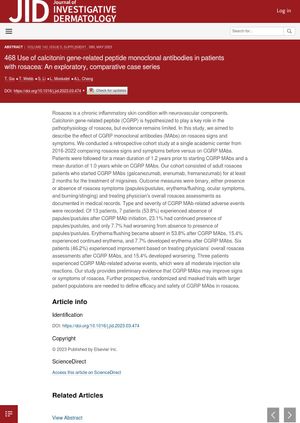Use of Calcitonin Gene-Related Peptide Monoclonal Antibodies in Patients With Rosacea: An Exploratory Comparative Case Series
April 2023
in “
Journal of Investigative Dermatology
”

TLDR CGRP MAbs treatment for migraines may also improve rosacea symptoms, but more research is needed to confirm its effectiveness and safety.
The study conducted a retrospective cohort analysis on 13 adult rosacea patients who were treated with calcitonin gene-related peptide monoclonal antibodies (CGRP MAbs) for migraines for at least 2 months. The patients were observed for an average of 1.2 years before starting CGRP MAbs and 1.0 years while on CGRP MAbs. The results showed that 53.8% of patients experienced an absence of rosacea symptoms such as papules/pustules and erythema/flushing after starting CGRP MAb treatment. Additionally, 46.2% of patients showed overall improvement in rosacea based on physicians' assessments. However, 15.4% of patients experienced worsening symptoms, and three patients had moderate injection site reactions as adverse events. The study concludes that CGRP MAbs may improve rosacea signs and symptoms, but further trials with larger patient populations are needed to confirm efficacy and safety.


